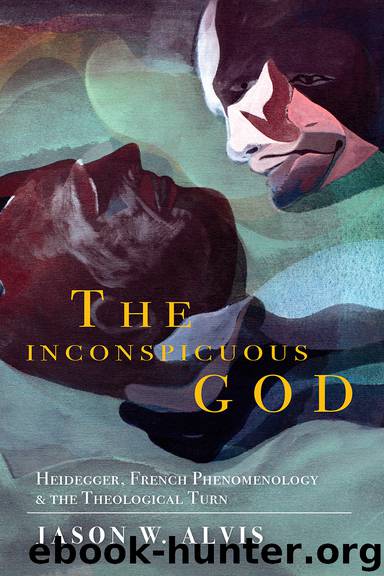The Inconspicuous God: Heidegger, French Phenomenology, and the Theological Turn (Indiana Series in the Philosophy of Religion) by Alvis Jason W

Author:Alvis, Jason W.
Language: eng
Format: epub
Publisher: Indiana University Press
Published: 2018-05-31T16:00:00+00:00
5Inconspicuous Adoration: Nancy, Heidegger, and a Praise of the Ordinary
ADORATION IS A participation in the active deformalization of the everyday and ordinary. Broadly conceived, when adoring, one sets apart and aside some particular thing as uniquely distinct from everything else. As the Latin adorare expresses, the ad (to) is the change of indicator that signals to an act that relates directly with a formal speech or “saying” (oratio) by differentiating it and making it one’s own. This making-ones-own, which is part and parcel of deformalizing the speech, shifts the adored from having a formal status and integrates it into the life of the adorer. Adoration creates divisions, dividing lines, and distinctions between things and oneself, and in this sense, adoration is as passive as it is active—one adores what is deemed striking, and one in turn is affected or struck by the adored.
Yet this striking entails that adoration leaves one speechless beyond any formal address. One is “set straight” (dirigere) to the phenomenon by setting it “apart” (the di of dirigere originates in dis or “apart”). To address is to be directed “to” (ad) what has announced itself in its own form and manner, but in a way that corresponds to the adored, which prevents its own phenomenalization from crystalizing into a static concept. Here, the adored leaves no clear and calculable traces behind to allow the adorer to address it in any complete way. If formalized, the adored runs the risk of becoming an idol, a status that cannot sustain the act of adoration for very long. To avoid idolization, it becomes necessary to relate with the adored through an active setting-apart that gives glory—as the doxology teaches—not only to the adored as a set of characteristics or traits, but as a formation that operates with a phenomenality utterly unique to it, and unlike any other.
These reflections on adoration appear consistent with the position of Jean-Luc Nancy, for whom the disenclosure of things in their wonder is what invokes a call to adoration. Not only is adoration an act of differentiating, but it also is an act whereby, more precisely, one adores and thereby differentiates the great differentiator. In recent years, Nancy has described how there is a theological innervation that innately is integrated into what it means to be human today in western societies. His turn to a deconstruction of Christianity began with the attempt to get away from what he saw to be the banal polarities between atheism and theism, and it is in Christianity that he found a kernel of hope for such a project, as Christianity paradoxically marked both the end of religion and its beginning. One essential core of this beginning is its form of adoration, which operates according to faith in differentiation itself. Religion more broadly, in his estimation, is scored by antiadoration for it no longer harbors the means and modes to one’s engaging in a fundamental relation with the wondrous. As such religion becomes bored with itself, and through its tiring doctrines attempts to carve out in society its own forms of legitimation and rationality.
Download
This site does not store any files on its server. We only index and link to content provided by other sites. Please contact the content providers to delete copyright contents if any and email us, we'll remove relevant links or contents immediately.
| Anthropology | Archaeology |
| Philosophy | Politics & Government |
| Social Sciences | Sociology |
| Women's Studies |
The remains of the day by Kazuo Ishiguro(8981)
Tools of Titans by Timothy Ferriss(8369)
Giovanni's Room by James Baldwin(7330)
The Black Swan by Nassim Nicholas Taleb(7111)
Inner Engineering: A Yogi's Guide to Joy by Sadhguru(6785)
The Way of Zen by Alan W. Watts(6603)
Asking the Right Questions: A Guide to Critical Thinking by M. Neil Browne & Stuart M. Keeley(5762)
The Power of Now: A Guide to Spiritual Enlightenment by Eckhart Tolle(5760)
The Six Wives Of Henry VIII (WOMEN IN HISTORY) by Fraser Antonia(5505)
Astrophysics for People in a Hurry by Neil DeGrasse Tyson(5182)
Housekeeping by Marilynne Robinson(4436)
12 Rules for Life by Jordan B. Peterson(4299)
Double Down (Diary of a Wimpy Kid Book 11) by Jeff Kinney(4261)
Ikigai by Héctor García & Francesc Miralles(4247)
The Ethical Slut by Janet W. Hardy(4243)
Skin in the Game by Nassim Nicholas Taleb(4240)
The Art of Happiness by The Dalai Lama(4125)
Skin in the Game: Hidden Asymmetries in Daily Life by Nassim Nicholas Taleb(3993)
Walking by Henry David Thoreau(3953)
